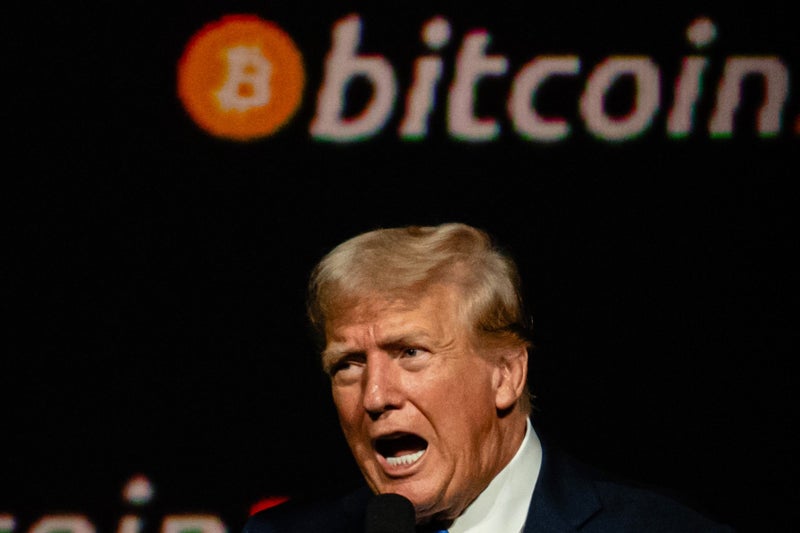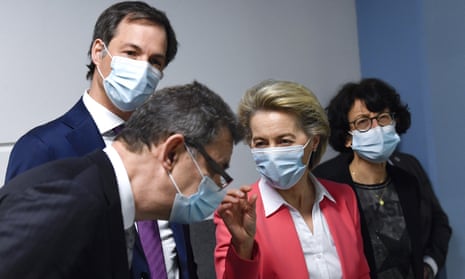The mood in Taipei is one of wariness as the new US president takes a blowtorch to diplomatic norms and assurances. It’s a bustling morning at the Dongmen wet market, in inner-city Taipei. Mr Yu is shouting at passersby, trying to offload his boxes of freshly steamed dumplings. In between customers, the self-professed “dumpling king” and his wife, Ms Liao, discuss Donald Trump.
![[Helen Davidson]](https://i.guim.co.uk/img/uploads/2019/04/04/Helen_Davidson.png?width=75&dpr=1&s=none&crop=none)
“He’s very positive, energetic,” says Yu, handing flour-covered coins to a customer. Liao chimes in: “The dancing! Isn’t he in his 80s?” Yu nods in agreement. But asked what Trump means for Taiwan, the elderly couple is less effusive. “With higher tariffs, prices will rise, and people won’t be able to stand it,” says Yu. “He just wants money,” Liao shrugs.
![[Mr Chang, a Taipei resident, says Donald Trump has been ‘very unfair’ with his accusations that Taiwan stole US semiconductor business.]](https://i.guim.co.uk/img/media/b5a1ec47c39d01ff099f5c18cfaa187b6fec9658/0_86_1280_768/master/1280.jpg?width=445&dpr=1&s=none&crop=none)
The last time Trump was president he was relatively popular in Taiwan, seen as a strong foil to China’s threats of annexation. During that first term, approvals of US weapons sales to Taiwan soared, US navy movements in the Taiwan Strait increased, and Trump broke with convention to accept a phone call from Taiwan’s then-president Tsai Ing-wen, lending legitimacy to her administration.
![[Mr Jiang and Mrs Pan, two market sellers in Taipei, are among residents concerned about Donald Trump’s plans for Taiwan, which relies on US support to deter Chinese annexation.]](https://i.guim.co.uk/img/media/e2503a4dac2eb389d575a2fdd902ce0d079c0998/0_85_1280_768/master/1280.jpg?width=445&dpr=1&s=none&crop=none)
But Trump’s return has brought a global shake-up, from the shuttering of USAid and negotiating with Russia over Ukraine, to talk about annexing Greenland and Canada, and taking control of Gaza for “redevelopment”. His messaging about support for Taipei has been mixed at best, and the island is on edge. A withdrawal of American support here would spark an existential crisis.
“The Trump administration has already demonstrated that it is willing to suddenly and without warning break from decades of bipartisan US policy on China,” says Bethany Allen, head of China investigations and analysis at ASPI. “[It] is signalling that it is excising liberal democratic values from its foreign policy calculations – opening up the possibility that US support for Taiwan may become divorced from any inherent value ascribed to Taiwan as a democracy worth preserving for its own sake.”.
China has long threatened to invade and annex Taiwan if it refused to peacefully accept “reunification” with the mainland. A military modernisation campaign driven by China’s leader, Xi Jinping, is bringing Beijing closer to being able to follow through.
Support from the US, Taiwan’s biggest backer, is considered crucial for the island’s survival. While the US officially refuses to say if it would militarily defend Taiwan against a Chinese attack, former president Joe Biden said repeatedly that under his leadership they probably would. The US sells Taiwan billions of dollars in weapons under legal obligations to provide it with defensive means and uses its military and foreign policy to support the peaceful “status quo” in the Taiwan Strait.
But Trump is now questioning the worth of the US’s support and floated the idea of charging Taiwan for protection. He’s accused Taiwan of “stealing” the US’s semiconductor business, and railed against trading partners – including Taiwan – having surpluses against the US. He has threatened or imposed steep and sweeping tariffs.
His stance has prompted questions about how Trump sees Taiwan – as a longstanding US friend, as a strategic asset, a business rival, or a bargaining chip with China. “There are two areas of uncertainty – the first is how the president will assess Taiwan’s value to the US in any given scenario or contingency, and the second is whether the rest of the government is influential when it comes to Trump’s opinion on how to support Taiwan,” says Rorry Daniels, managing director of the Asia Society Policy Institute.
There have been some positive signs. Earlier this month, after Trump met Japan’s prime minister Ishiba Shigeru, the two leaders released a statement specifically referencing Taiwan, with updated and stronger language saying the US and Japan “opposed any attempts to unilaterally change the status quo by force or coercion”. This week the US state department removed a line from its Taiwan page that explicitly said the US did not support Taiwan independence. Both were welcomed by Taipei and criticised by Beijing.
But analysts have cautioned that these events have come from Trump’s administration, not the individual president who is prone to sudden pronouncements and executive orders that can undo decades of policy on a whim. Daniels says key members of the administration have “more expansive views” on Taiwan and hawkish stances on China – such as secretary of state Marco Rubio and national security adviser Mike Waltz – “but it’s not clear how deeply those views influence the president on any given day or issue”.
Trump’s negotiations over Ukraine have particularly alarmed people in Taiwan, who see parallels between Russia’s invasion and China’s aims. Allen says there is far less sympathy for China in the Republican party than there is for Russia. But it’s another area where Trump’s unpredictability has made people nervous, given Trump doesn’t seem to value defending democracies against authoritarianism. Few analysts think that Taiwan could be used effectively as a bargaining chip. But it’s possible that President Xi Jinping could ask Trump to support “peaceful reunification” and weaken Taiwan’s position. Biden was asked and refused. Trump might agree. Or, he could go the other way.































